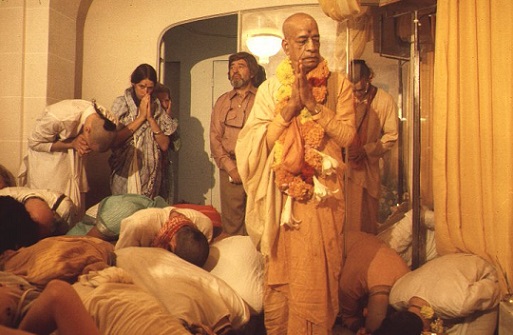(Click to enlarge photo of Srila Prabhupada and disciples)
"It is said in the śāstra,
akāmaḥ sarva kāmo vā
mokṣa kāma udāra-dhīḥ
tīvreṇa bhakti-yogena
yajeta paramaṁ puruṣaḥ
(SB 2.3.10)
(A person who has broader intelligence, whether he be full of all material desire, without any material desire, or desiring liberation, must by all means worship the supreme whole, the Personality of Godhead.)
This is injunction. We are mixed up. Somebody has got all desire to fulfill within this material world. Sarva-kāmaḥ. They never become desireless—increasing, increasing, increasing, one after another. And that is... They are called sarva-kāmaḥ. And akāma means no more desire. Sarvopādhi-vinirmuktaṁ tat-paratvena nirmalam (CC Madhya 19.170). So we have to purify ourself. So to purify ourself means don't desire anything material. 'Then I shall become void of desire?' No, not void of desire. Real desire must be there. Therefore we are singing daily, guru-mukha-padma-vākya, cittete kariyā aikya, āra nā koriyā mane āśa. Āra... 'No more. That's all.' Āra nā koriyā mane āśa. We are singing daily. You must understand what is the meaning. Because we are bewildered, we are misdirected, so..., so guru's word, that should be taken seriously. Āra nā koriyā... 'No more, anything.' That is... Therefore how much difficult it is to find out such guru. Ādau gurvāśrayam. First of all you have to accept guru. Tad-vijñānārthaṁ sa gurum eva abhigacchet (MU 1.2.12). So we have to follow guru.
'So how I can find out the real guru by whose words I'll be nicely directed and achieve?' That is not very difficult. You read Bhagavad-gītā, you'll understand. Just like Arjuna. When he was perplexed, he accepted Kṛṣṇa guru. He said, śiṣyas te 'ham (BG 2.7): 'I become Your..., now. We are talking friendly. The argument will not be ended. Now I become Your disciple.' Śiṣyas te 'ham. Because as soon as one becomes a śiṣya (disciple)... Śiṣya means under the order, regulation. A person cannot disobey the order of guru. Then he is śiṣya. If he argues, he's not śiṣya. He's not a śiṣya. Therefore Arjuna says, śiṣyas te 'ham: 'I surrender, voluntarily surrender to become Your disciple. Now I shall not argue.' That is called śiṣya. If you argue, then you are not a śiṣya.
Guru-mukha-padma-vākya, cittete koriyā, āra nā koriyā mane āśa. This is tapasya, that 'I shall not act anything which is not ordered by my guru.' That tapasya (voluntary austerity). Tapo divyaṁ putrakā (SB 5.5.1). Then we'll be nicely guided, and then sattva śuddhyam. Then our this existence will be purified. And as soon as our existence is purified, then we realize the situation, what is God, what is our relationship with Him, what is our activities, athāto brahma jijñāsā, janmādy asya yataḥ (SB 1.1.1), everything."
(Srila Prabhupada Lecture, Mayapur, March 13, 1976)
.
